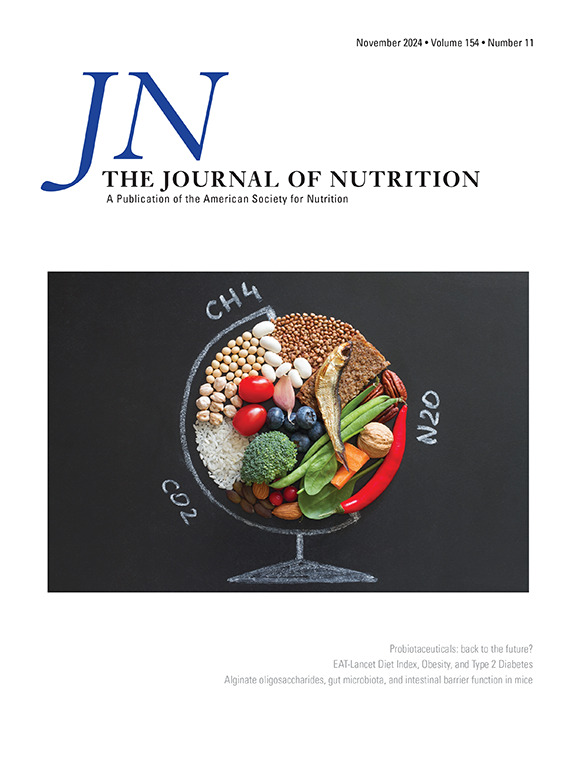A Well-Balanced Vegan Diet Does not Compromise Daily Mixed Muscle Protein Synthesis Rates when Compared with an Omnivorous Diet in Active Older Adults: A Randomized Controlled Cross-Over Trial
IF 3.7
3区 医学
Q2 NUTRITION & DIETETICS
引用次数: 0
Abstract
Background
Plant-based foods have reduced protein digestibility and frequently display unbalanced amino acid profiles. Plant-based foods are therefore considered inferior to animal-based foods in their anabolic potential. No study has assessed the anabolic potential of a vegan diet that provides a large variety of plant-based protein sources in older adults.
Objectives
To investigate the effect of a 10-d vegan diet on daily mixed muscle protein synthesis (MPS) rates in comparison with an isocaloric, isonitrogenous, omnivorous diet in community-dwelling older adults.
Methods
This cross-over trial assessed 34 community-dwelling older adults (72 ± 4 y, 18 males, 16 females), who were randomly assigned to consume a 10-d controlled vegan diet, followed by a controlled omnivorous diet (60% animal protein), or vice versa. One day before the study diets, participants consumed 400 mL deuterated water, followed by daily doses of 50 mL. Subsequent plasma and muscle samples were collected during the intervention period. Physical activity levels were assessed using accelerometry. Secondary outcomes were cardiometabolic risk factors and appetite. Statistical analyses were performed using linear mixed models, and results are presented as means ± standard errors.
Results
Integrated MPS rates did not differ between the vegan (1.23 ± 0.04%/d) and omnivorous (1.29 ± 0.04%/d) diets (P = 0.2542). Plasma low-density lipoprotein (Δ0.23 ± 0.03, P < 0.0001), high-density lipoprotein (Δ0.03 ± 0.14, P = 0.0387), and total cholesterol (Δ0.25 ± 0.04, P < 0.0001) levels were significantly lower succeeding the vegan diet than the omnivorous diet. There were no significant differences between the omnivorous and the vegan diet in fasting plasma triglyceride, glucose and insulin levels, homeostasis model assessment of insulin resistance, and systolic and diastolic blood pressure (P > 0.05). Physical activity levels were high (12,460 ± 4512 steps/d).
Conclusions
A well-balanced vegan diet providing a variety of plant-based protein sources does not compromise daily MPS rates when compared with an isocaloric, isonitrogenous omnivorous diet in physically active, older adults.
This trial was registered at clinicaltrials.gov as NCT05624333 (https://clinicaltrials.gov/study/NCT05624333).
一项随机对照交叉试验:与活跃的老年人杂食性饮食相比,均衡的纯素饮食不会损害每日混合肌肉蛋白质合成率。
背景:植物性食物降低了蛋白质的消化率,并且经常显示不平衡的氨基酸分布。因此,植物性食物的合成代谢潜力被认为不如动物性食物。没有研究评估纯素饮食在老年人中提供大量植物性蛋白质来源的合成代谢潜力。目的:研究10天纯素饮食对社区老年人每日混合肌肉蛋白合成(MPS)率的影响,并与等热量、等氮、杂食性饮食进行比较。方法:这项交叉试验评估了34名居住在社区的老年人(72±4岁,18名男性,16名女性),他们被随机分配为10天的控制纯素饮食,然后是控制杂食性饮食(60%动物蛋白),反之亦然。在研究饮食前一天,参与者饮用400毫升氘化水,然后每天饮用50毫升。随后在干预期间收集血浆和肌肉样本。使用加速度计评估身体活动水平。次要结局是心脏代谢危险因素和食欲。采用线性混合模型进行统计分析,结果以均数±标准差表示。结果:纯素饮食(1.23±0.04% /天)和杂食性饮食(1.29±0.04% /天)的综合MPS发生率无显著差异(P=0.2542)。血浆LDL- (Δ0.23±0.03,p0.05)。身体活动量高(12460±4512步/天)。结论:在体力活动的老年人中,与等热量、等氮杂食性饮食相比,提供各种植物性蛋白质来源的均衡纯素饮食不会影响每日MPS率。临床试验注册:https://clinicaltrials.gov/study/NCT05624333。
本文章由计算机程序翻译,如有差异,请以英文原文为准。
求助全文
约1分钟内获得全文
求助全文
来源期刊

Journal of Nutrition
医学-营养学
CiteScore
7.60
自引率
4.80%
发文量
260
审稿时长
39 days
期刊介绍:
The Journal of Nutrition (JN/J Nutr) publishes peer-reviewed original research papers covering all aspects of experimental nutrition in humans and other animal species; special articles such as reviews and biographies of prominent nutrition scientists; and issues, opinions, and commentaries on controversial issues in nutrition. Supplements are frequently published to provide extended discussion of topics of special interest.
 求助内容:
求助内容: 应助结果提醒方式:
应助结果提醒方式:


